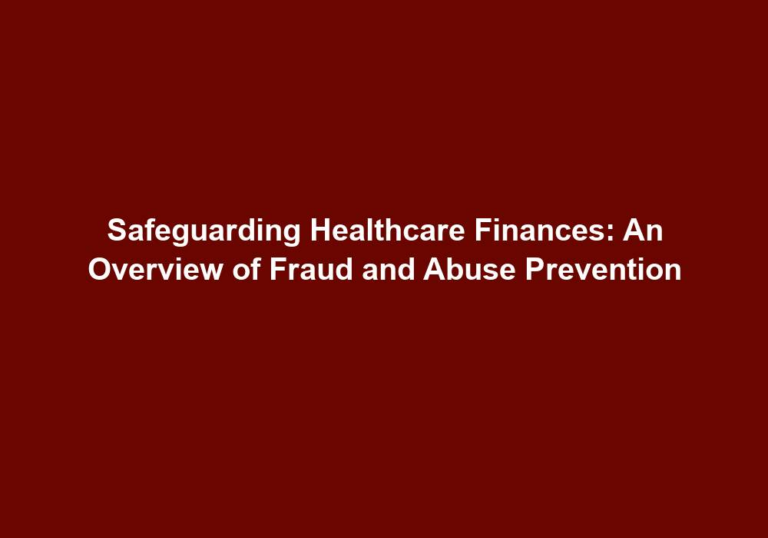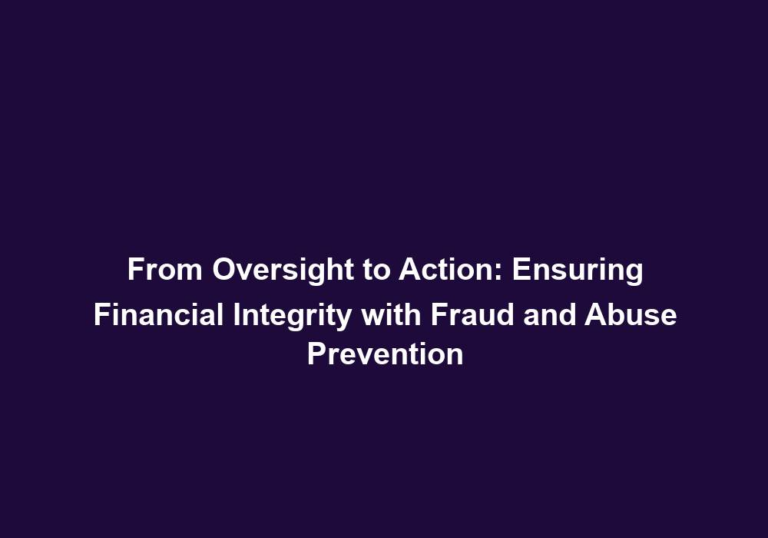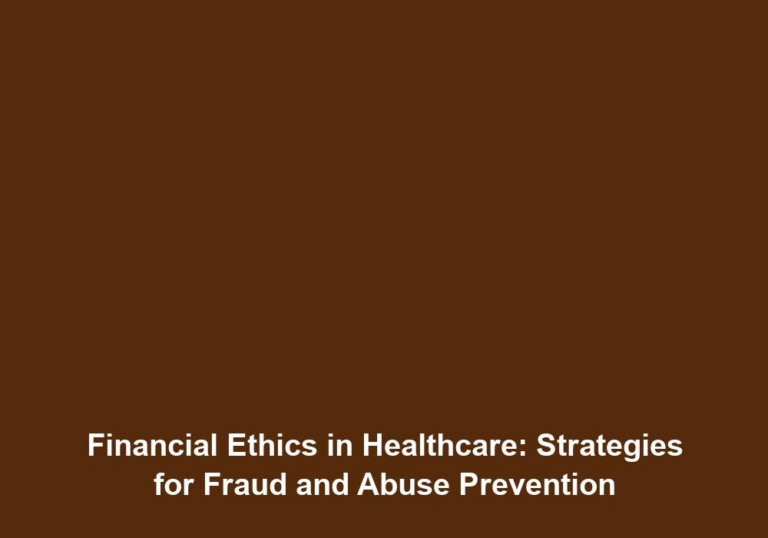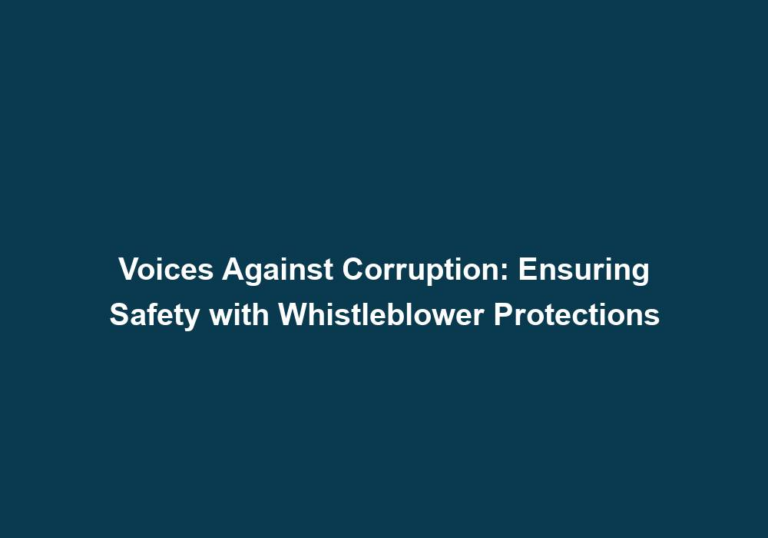Protecting the Protectors: An Overview of Whistleblower Protections in Healthcare
Whistleblower protection plays a crucial role in safeguarding the integrity of healthcare systems worldwide. Whistleblowers often risk their careers, relationships, and personal safety to expose wrongdoing, fraud, or other unethical practices within their organizations. In recognition of their invaluable contributions, many countries have enacted laws and regulations to protect these brave individuals.
The Importance of Whistleblower Protection in Healthcare
Whistleblowers serve as the eyes and ears of the healthcare industry, acting as a critical line of defense against corruption, malpractice, and other misconduct. Their disclosures can lead to uncovering fraud, patient safety violations, waste of resources, and other unethical behaviors that may compromise the well-being of patients and the integrity of healthcare systems.
Whistleblower protection is crucial in healthcare for several reasons:
-
Enhanced Transparency: Whistleblower protection fosters a culture of transparency and accountability within healthcare organizations. It encourages employees to come forward with concerns, leading to the detection and prevention of misconduct and malpractice. By promoting an environment where individuals feel safe to report wrongdoing, healthcare organizations can identify and address potential issues before they escalate.
-
Improved Patient Safety: Whistleblower disclosures often uncover practices that put patient safety at risk. By protecting whistleblowers, healthcare organizations can address these issues promptly, ensuring the well-being of their patients. Whistleblowers play a vital role in identifying and reporting incidents of negligence, substandard care, or unethical behavior that may harm patients. Their actions help drive improvements in patient safety and the overall quality of healthcare delivery.
-
Financial Savings: Whistleblower reports can help identify fraudulent activities that result in financial losses. By protecting whistleblowers, healthcare organizations can recover funds, prevent future losses, and allocate resources more effectively. Whistleblowers can uncover instances of billing fraud, kickbacks, or misuse of funds that drain financial resources from the healthcare system. By encouraging and protecting these individuals, healthcare organizations can mitigate financial risks and ensure resources are directed towards patient care.
Legal Frameworks for Whistleblower Protection in Healthcare
Various legal frameworks around the world strive to protect whistleblowers in the healthcare industry. These protections typically include immunity from retaliation, including termination, demotion, or any form of adverse employment action, as well as safeguards against harassment or discrimination.
1. United States
In the United States, the False Claims Act (FCA) and the Whistleblower Protection Act (WPA) are two key pieces of legislation that provide protection to healthcare whistleblowers. The FCA allows individuals to file lawsuits on behalf of the government to recover funds lost due to fraud, while the WPA safeguards whistleblowers who disclose misconduct within federal agencies. These laws aim to ensure that whistleblowers are protected from retaliation and have legal recourse in case of adverse actions.
2. United Kingdom
The United Kingdom has enacted the Public Interest Disclosure Act (PIDA) to protect whistleblowers across various sectors, including healthcare. The PIDA provides legal protection to employees who disclose wrongdoing, ensuring they are shielded from unfair treatment or dismissal as a result of their actions. This legislation encourages individuals to come forward with concerns and helps maintain the integrity of healthcare systems by holding wrongdoers accountable.
3. Australia
In Australia, the Public Interest Disclosure Act (PID Act) has been established to encourage and protect whistleblowers who report corruption, misconduct, or malpractice in the public sector, including healthcare organizations. The PID Act ensures that whistleblowers receive protection from reprisals and offers mechanisms for disclosure within a safe and confidential environment. This legislation promotes a culture of accountability and transparency in the healthcare industry.
Benefits and Challenges of Whistleblower Protection
Benefits
Whistleblower protection brings several benefits to healthcare systems:
-
Enhanced Transparency: Whistleblower protection fosters a culture of transparency and accountability within healthcare organizations. It encourages employees to come forward with concerns, leading to the detection and prevention of misconduct and malpractice. By promoting an environment where individuals feel safe to report wrongdoing, healthcare organizations can identify and address potential issues before they escalate.
-
Improved Patient Safety: Whistleblower disclosures often uncover practices that put patient safety at risk. By protecting whistleblowers, healthcare organizations can address these issues promptly, ensuring the well-being of their patients. Whistleblowers play a vital role in identifying and reporting incidents of negligence, substandard care, or unethical behavior that may harm patients. Their actions help drive improvements in patient safety and the overall quality of healthcare delivery.
-
Financial Savings: Whistleblower reports can help identify fraudulent activities that result in financial losses. By protecting whistleblowers, healthcare organizations can recover funds, prevent future losses, and allocate resources more effectively. Whistleblowers can uncover instances of billing fraud, kickbacks, or misuse of funds that drain financial resources from the healthcare system. By encouraging and protecting these individuals, healthcare organizations can mitigate financial risks and ensure resources are directed towards patient care.
Challenges
While whistleblower protection is crucial, it also comes with certain challenges:
-
Fear of Retaliation: Whistleblowers often fear retaliation from their employers, colleagues, or industry peers. This fear may prevent potential whistleblowers from coming forward, thus limiting the detection and prevention of misconduct. Healthcare organizations need to create a supportive and safe environment where individuals feel confident in reporting concerns without the fear of adverse consequences.
-
Confidentiality Concerns: Whistleblowers may worry about the confidentiality of their disclosures. Ensuring a secure and confidential reporting process is crucial to encourage individuals to report wrongdoing without fear of exposure. Healthcare organizations should establish mechanisms to protect the identity of whistleblowers and handle their disclosures with utmost confidentiality.
-
Lack of Awareness and Support: Some individuals may be unaware of the protections available to whistleblowers or hesitate to come forward due to a lack of support or guidance. Raising awareness and providing comprehensive support systems can address this challenge. Healthcare organizations should educate employees about their rights as whistleblowers and provide them with the necessary resources and support throughout the reporting process.
Encouraging Whistleblowing and Building Trust
To create an environment that encourages whistleblowing and builds trust, healthcare organizations should consider implementing the following measures:
1. Robust Whistleblower Policies and Procedures
Healthcare organizations should establish clear policies and procedures that outline the process for reporting and handling whistleblower disclosures. These policies should ensure confidentiality, provide protection against retaliation, and establish mechanisms for investigating and addressing reported concerns. By having well-defined procedures in place, organizations can demonstrate their commitment to addressing wrongdoing and protecting whistleblowers.
2. Training and Education
Offering comprehensive training and education programs to employees can promote awareness of whistleblower protections and cultivate a culture that values ethical behavior and transparency. Training should cover the importance of whistleblowing, the reporting process, and the available support mechanisms. By educating employees about their rights and the benefits of whistleblowing, organizations can encourage individuals to come forward with concerns.
3. Anonymous Reporting Channels
Implementing anonymous reporting channels allows employees to disclose concerns without revealing their identities, addressing confidentiality concerns and reducing the fear of retaliation. These channels should be easily accessible, well-publicized, and ensure that reported concerns are promptly and appropriately addressed. By providing anonymous reporting options, healthcare organizations can create a safe space for whistleblowers to share information without the fear of being identified.
4. Whistleblower Support Programs
Healthcare organizations should establish support programs to assist whistleblowers throughout the reporting process. These programs may include legal assistance, counseling services, and protection against retaliation. Ensuring that whistleblowers receive the necessary support can encourage others to come forward without fear. By offering comprehensive support programs, organizations demonstrate their commitment to protecting whistleblowers and fostering a culture of accountability.
Conclusion
Whistleblower protection is crucial in healthcare to safeguard the integrity of healthcare systems, protect patients, and promote transparency and accountability. By enacting robust legal frameworks, implementing supportive policies and programs, and fostering a culture that encourages ethical behavior, healthcare organizations can create an environment that protects and values the contributions of whistleblowers. It is imperative that healthcare organizations prioritize whistleblower protection to ensure the well-being of patients and the integrity of the healthcare industry as a whole.






